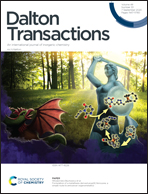Quinoline-triazole half-sandwich iridium(iii) complexes: synthesis, antiplasmodial activity and preliminary transfer hydrogenation studies†
Abstract
Iridium(III) half-sandwich complexes containing 7-chloroquinoline-1,2,3-triazole hybrid ligands were synthesised and their inhibitory activities evaluated against the Plasmodium falciparum malaria parasite. Supporting computational analysis revealed that metal coordination to the quinoline nitrogen occurs first, forming a kinetic product that, upon heating over time, forms a more stable cyclometallated thermodynamic product. Single crystal X-ray diffraction confirmed the proposed molecular structures of both isolated kinetic and thermodynamic products. Complexation with iridium significantly enhances the in vitro activity of selected ligands against the chloroquine-sensitive (NF54) Plasmodium falciparum strain, with selected complexes being over one hundred times more active than their respective ligands. No cross-resistance was observed in the chloroquine-resistant (K1) strain. No cytotoxicity was observed for selected complexes tested against the mammalian Chinese Hamster Ovarian (CHO) cell line. In addition, speed-of-action assays and β-haematin inhibition studies were performed. Through preliminary qualitative and quantitative cell-free experiments, it was found that the two most active neutral, cyclometallated complexes can act as transfer hydrogenation catalysts, by reducing β-nicotinamide adenine dinucleotide (NAD+) to NADH in the presence of a hydrogen source, sodium formate.



 Please wait while we load your content...
Please wait while we load your content...